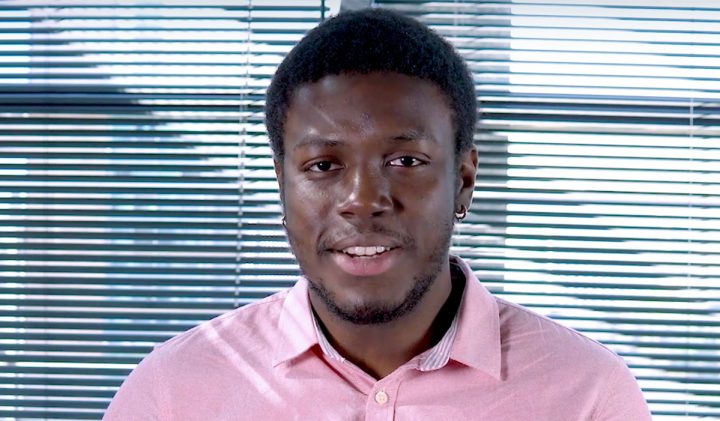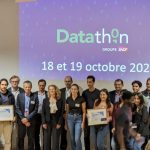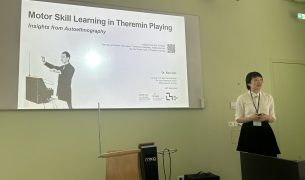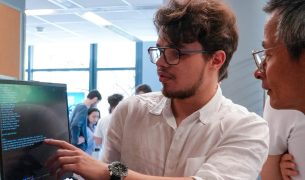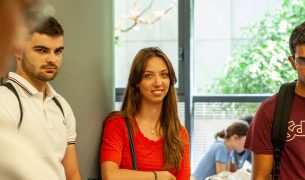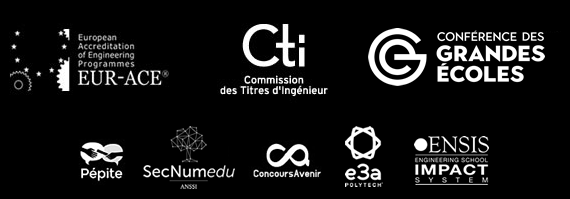A soon-to-be data engineer, Jean-David Alexandre, class of 2022, is currently studying for a Master’s degree at ESILV, specialising in the fields of data and artificial intelligence. So how do you go about training for a career in data? He talks about it in a video.
The Data and Artificial Intelligence major in the engineering cycle at ESILV aims to train specialists in data, be it massive or not, from its collection, modelling, and storage to its analysis and interpretation.
Jean-David was inspired by the pedagogy of a generalist engineering school at the heart of digital technologies and chose ESILV to further his training in data engineering and acquire multidisciplinary skills. Watch the video.
Meet Jean-David Alexandre, Data & AI student at ESILV
My name is Jean-David Alexandre Koye. I’m 24 years old, I’m from the Ivory Coast, and I’m studying for a Master’s degree in Data and Artificial Intelligence at ESILV. I graduated from high school when I was 16, and I hesitated about which country to choose; initially, I had opted for France, but things didn’t work out so well, and I decided to go to China.
I did two years of learning the Chinese language first. China is an entirely different world. If you don’t speak Chinese, you can’t live there. Until I started my bachelor’s degree, I did two years, which takes me from 16 to 18.
From the age of 18, I start my bachelor in telecommunications, so four years, 18 – 22 years old and I’m elected as the valedictorian of my class. I was lucky enough to get a scholarship to continue two more years to do a research master 1 in information and communication.
Studying data in a generalist engineering school
Then, to specialise and have much more technical skills, I applied to ESILV, and I’ve been there since October 2020. I researched the Data schools in France and specifically in Paris, which led me to the letudiant.fr website.
There was a ranking of engineering schools. I aimed to go to an engineering school. The first point was, apart from doing data, to be in an engineering school. I looked at the rankings, I applied first for the top 10, and I found ESILV.
What I liked about the ESILV program, unlike the others – and this is not to belittle the other programs – was the fact that the ESILV program was much more general.
The other universities often offered programmes that were a bit more specialised. I was starting to get interested in data and didn’t necessarily know which way I would go. The ESILV Masters program, with its very global skills, programmes that included everything, allowed me to determine what I wanted to do after this Masters, what I wanted to do as a job later on.
Mastering data analysis and visualisation tools
This is a very significant point because the courses are in English, a different reason for choosing this programme at ESILV. We have modules at ESILV such as “data viz'”, around which we also have courses.
Associating courses with modules allows us to test ourselves in terms of our final average. For example, in the module, you can have two or three classes, and in the end, you will get the average score for the module; somehow, it can help you find your way.
I already knew what I wanted to do, but I still wanted to have the overall skills, so general knowledge in all areas, if I will have to touch on certain parts that I do not necessarily like in the future.
At least I already have a clear idea of what it is. It’s that part that I think is very good.
I don’t think I can be very objective in terms of content, given the somewhat complicated situation with COVID. Despite that, things have gone very well with the online courses.
The teachers are pretty available. They allow us to express ourselves, ask many questions, and even email them after the classes.
I am delighted with this part, but I hope that the situation will improve; perhaps, next year another interview will be held to give you a very objective opinion once the face-to-face courses return.
The promise of data and artificial intelligence
The Data & Artificial Intelligence programme allows you to complete two internships during the master’s degree.
The first year starts in September until the end of March; then, from April 1st, you begin the internships until September. It’s the same for the second year, from September to February, earlier, and then, from February to September, you do another internship.
This is one of the reasons why I chose this programme. Despite the health situation, I was able to get my internship, which I will start on April 6th, and I hope that everything will go well.
I will be in charge of management and data in a data manager position at Europ Assistance. I will be supporting the chief data officer, i.e. the person at the head of the data department, in his missions.
I want to be a business intelligence analyst. After the two years of the master’s degree, I intend to find a job directly, and fortunately, data is a booming field.
I hope it won’t be too complex for me, and I’m giving myself five years to gain experience in data and BI, and then either start a consultancy with a partner or start my solo venture.
We often hear: “Data is the new oil”. It’s the new black gold. But it also takes a lot of time and personal work.
I can’t go a day without working. If you are interested, I encourage you to apply, especially to ESILV, to get a thoroughly global skill set and then go for the job you want.









